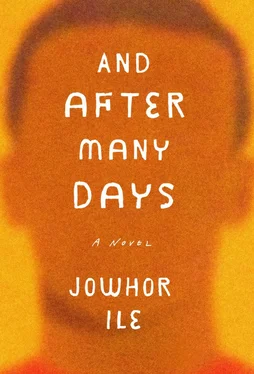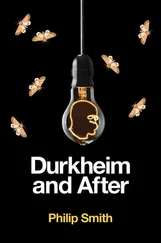Ma served and passed the food to them, leaning into the car from where she stood by the trunk. Spicy fried rice with diced carrot, green peas, chopped liver fried to a crisp, and stewed chicken. Marcus insisted Ma serve him only a small portion so he didn’t doze off at the wheel from a heavy stomach.
They all dug in.
“Why did Bendic not come?” Paul asked.
“He probably has a court case in Lagos or something,” Ajie informed Paul, teeth clenched, eyes squinting as he chewed a piece of chicken thigh.
“Your father is resting,” Ma said. “The doctor asked him to take some days off and relax at home.”
“Some days off? Is Bendic sick?” Paul asked, looking at Ma.
“He just needs rest; you know how your father carries on with work,” Ma said. “Dr. Idoniboye said he must slow down a bit, reduce his movement a little.”
“I can’t imagine Bendic obeying any instruction like that,” Paul said.
Ajie thought of Bendic lying in bed compulsorily. Faceup, hands by his sides, not moving or turning, just lying there inert for a whole week and then getting up to go about his business when the time had been served fully.
“At home or in the hospital?” Paul asked.
“At home now,” Ma replied, a little reluctant. “He stayed in the hospital for three days first. He’s fine, don’t worry your heads.”
She didn’t tell them that Bendic had slumped in his office one afternoon and been rushed to the hospital, that he had remained unconscious for two days before he came to. She didn’t tell them about the series of tests they had to run; about carrying him back and forth between their home and Braithwaite Memorial because that was the only hospital in Port Harcourt that was equipped to carry out the tests. Then there was the weeklong wait for the results. She didn’t tell them how she had prayed, really prayed, for the first time in a long time; how she had felt she was standing on a precipice, a raging wind at her back, the dark bottomless unknown before her. They would never know of the promise she made to God at that moment, and then to herself, to nature, to the universe, to whatever was good and great out there, that if only things could turn out right, please let this thing turn out right.
She looked up at her children and said, “Your father wrote you letters, but finish your food first.”
Marcus looked back and said, “Look at all the food still on your plates. Paul, Ajie, what’s happening? Quick quick, there’s still more food in the cooler.”
For afters, there was a fruit cocktail: pineapple, paw-paw, and mango, sliced and swimming in the juice in a big bowl. The ripe, sweet smell of the mango filled the car, and two flies buzzed about. Paul held his palm up, aiming to hit as the flies came his way. They buzzed and zigzagged about the car, bumping into the windows as Marcus beat the air with a newspaper, and then they escaped.
“I went to see Bibi last weekend,” Ma said. “She was selected to represent her school in an all-girls cantata.”
“Really, where are they playing?” Paul asked.
“Ilorin.”
“Wow,” the children chorused.
“Is she flying there or going by bus?” Paul asked.
“They are flying,” Ma replied.
“That’s all we will hear about when we go back home,” Ajie said. “Bibi will talk about it so much, like she is the first person in the whole world to have ever entered an airplane.”
“Jealousy!” Paul laughed as if he weren’t also secretly coveting Bibi’s airplane adventure.
“Is she still playing that instrument, what is it called?” Ajie asked to lower the tone.
“Oboe, yes, she is playing two solos,” Ma replied.
“Shitted!” He cupped his mouth with his left hand.
“What type of language is that?” Ma threw him a disapproving glance and leaned forward to the glove compartment to get a toothpick.
“Bibi shouldn’t be doing things like that,” Paul joined in.
“What do you mean, Paul?” Ma challenged. “She plays the oboe well.”
“Ma, just hear how it sounds: oboe,” Ajie said.
“Like ‘oh no.’ ” Paul laughed. “Why can’t she just play the trumpet or drums?”
“Trust Bibi to pick an odd instrument,” Ajie said.
“Her music teacher is very proud of her, and so is her principal. You haven’t been chosen yet to represent your school in anything.”
“Shitted. Ma, that’s harsh,” Ajie said, laughing. “Still, Bibi is running down our family name.”
“Paul, what’s this ‘shitted’ your brother keeps saying?”
“Don’t mind him, Ma. It’s just silly junior boys’ slang.”
“What is wrong with it?” Ajie said.
“Is that what we sent you here to learn?” Ma’s voice had risen to a scold. She turned to face Ajie properly. “Let this be the first and the last time I will hear it from your mouth, you hear?”
Having sufficiently flattened the mood and looking for a way to revive it, she opened a bottle of Sprite and passed it to Paul. “Which one do you want?” she asked Ajie.
“Fanta,” Ajie said.
After they had eaten, they sat back, watching other families. Marcus put on the radio and turned the knob until it caught a station playing a reggae tune — Majek Fashek singing “Send Down the Rain,” which at that moment seemed fitting. Soon it was time for Ma and Marcus to drive back to Port Harcourt.
Ajie rummaged through the bag of provisions Ma had just handed him. Paul was looking through his bag, too. Ma gave them their letters from Bendic and told them to send their replies once they could. “Do you still have stamps left? I should have gotten you some more, completely forgot.”
“They sell stamps in school,” Ajie said, “but I still have about six left.”
“You people shouldn’t forget my birthday-o,” Paul said. “You can send a money order. Just a suggestion. And yes, tell Bendic to expect my letter.”
“I will tell him,” Ma said. Regarding Paul’s birthday, she said they could have a party, by the grace of God, when they returned for midterm break or long holiday. Ajie thought Ma was being rather agreeable, so he said he wouldn’t mind if they threw a party for him as well. Ma asked Paul how he was coping with being deputy head boy, and Paul said there was really nothing to it. Ma looked at Ajie to comment, and Ajie looked back at her and said nothing.
“We’ve begun heats for the interhouse sports competition.” Ajie perked up. “I’m marching.”
“That’s good,” Ma said, then turned the other way. “What about you, Paul?”
“Paul is in the senior boys’ four-by-hundred relay. He’s throwing the javelin, too,” Ajie said.
They drove to the entrance of the dormitory area and the boys got out of the car, stood together, and waved to their mother and Marcus, who honked twice as the car rolled off. They watched as the car went down the sloping road toward the classroom area, passing by the staff rooms, the teachers’ tearoom, the laboratories, the library, the fields, and the parking lot slowly emptying of cars. The blue Peugeot 504 paused by the gate for a security check, and then, with the orange light indicating left, disappeared into the evening mist.
Ajie did not read his letter until after dinner. He put the envelope carefully in between his introductory technology textbook as the bell rang for night prep. The handwriting seemed particularly formal, but it was one he was used to.
My dear Ajie,
I’m sorry I couldn’t come with your mother for your visiting day as I promised. The doctor has advised me to take some rest so I’m staying back this time and will hear all about how you and your brother are doing when your mother and Marcus return.
I hope you’ve adjusted well now to life in the dormitory. It can’t be easy, but I know you are tough enough to survive it. I hope your brother is showing you the ropes so you avoid getting into too much trouble.
Читать дальше












